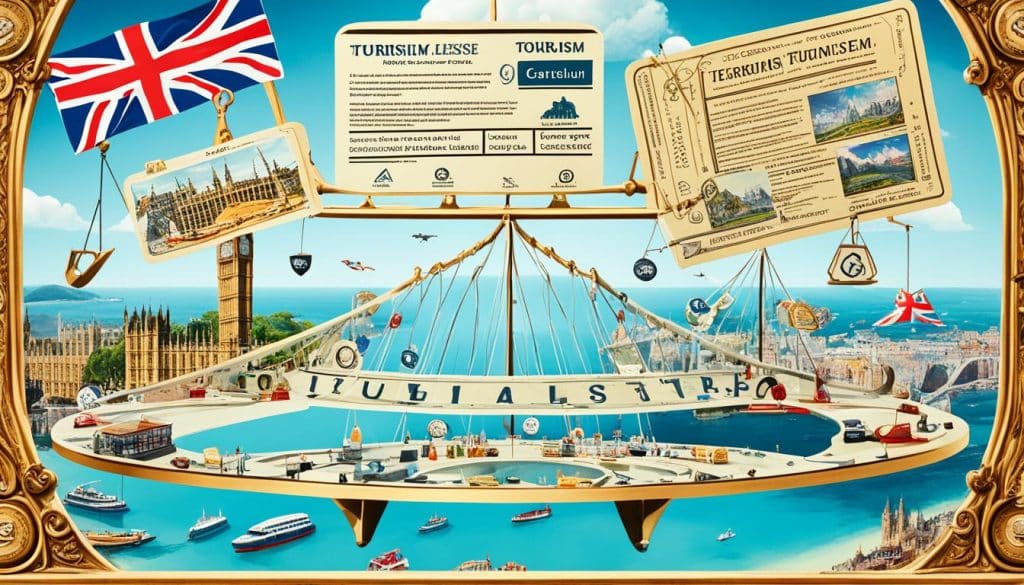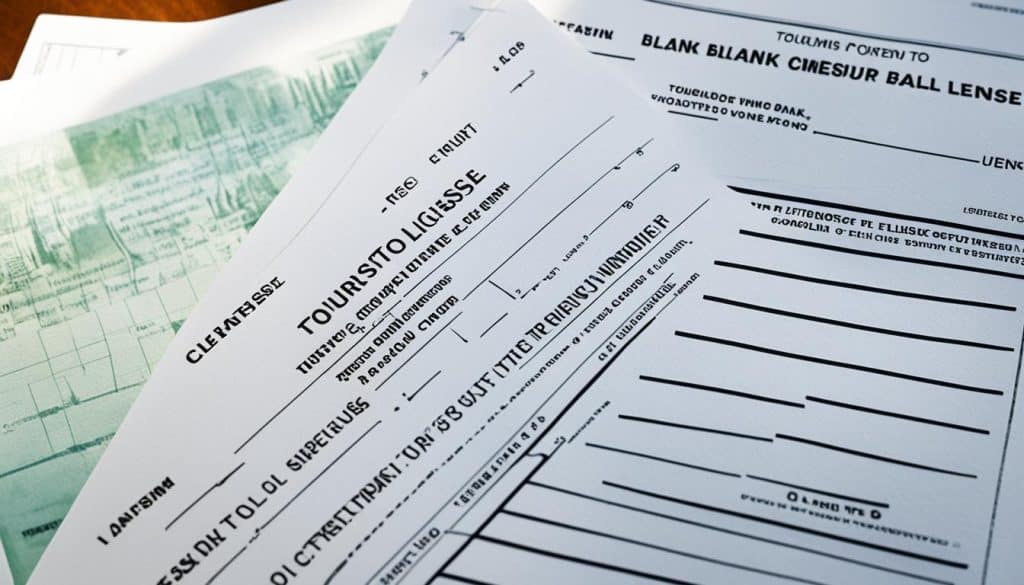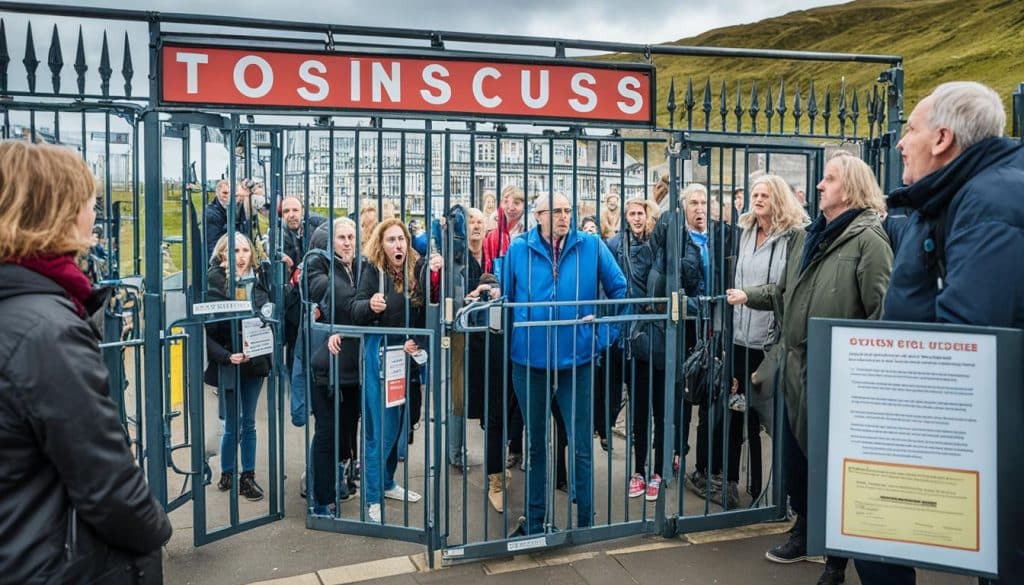In the UK’s busy tourism sector, following hospitality industry regulations is crucial. If you run a tourism business without the correct license, you could face serious legal problems. These licenses make sure businesses are safe and run responsibly, especially those that sell alcohol or offer adventure activities.
Not knowing the law is no excuse for breaking it. If you ignore UK tourism legal implications, you could be fined, your business could be shut down, or you could go to jail for major offences. Entrepreneurs in the hospitality field must understand these legal needs fully.
Key Takeaways
- It’s vital to comply with tourism sector laws to avoid legal problems.
- The right licenses protect your business and your customers.
- Failing to comply can lead to fines, shutdowns, or jail.
- Businesses offering alcohol sales or adventure experiences must take extra care.
- Knowing and following UK tourism laws is key for all tourism businesses.
Understanding the Tourist Business License Requirements
In the world of tourism, it’s vital to follow the rules. The UK has strict laws on this. Knowing what permits you need keeps your business running smoothly.
Common Licodes for Tourism Businesses
What you need depends on your business. For tourism in the UK, you might need:
- Street trading licenses for outdoor sales.
- Premises licenses for film or music events.
- Food and alcohol licenses to offer eats and drinks.
Permits for Adventure Activities
Offering adventure? Get the right permits, especially for under-18s. Key permits cover:
- Climbing walls, abseiling, watersports.
- Boat licenses for offering rides.
Operating in Protected Areas
Working in special places? You’ll need extra permits. These licenses make sure your business doesn’t hurt nature. It helps keep these spots beautiful for everyone.
The Legal Framework for Tourism Businesses in the UK

The UK tourism legislations provide rules for tourism businesses. They help protect natural and historical sites for everyone. It’s important for companies to follow these rules to avoid legal trouble.
Tourism businesses must be careful when operating in protected areas like National Parks. These places have rules to keep their beauty and wildlife safe. Businesses need to know and follow these rules closely.
When it comes to listed buildings, there are extra rules to follow. Businesses must get permission before making changes to historical buildings. If they don’t, they could face big fines. This shows how vital it is to follow the UK tourism legislations.
The regulatory framework in the UK helps make sure tourism businesses act responsibly. By knowing and following these legal rights and obligations, businesses help protect the UK’s heritage.
Not following the UK tourism legislations can result in severe consequences. This includes fines or even having to close down. That’s why it’s essential for tourism operators to keep up-to-date and work with regulatory agencies.
What Happens if You Operate without a Tourism Business Licence?
Operating without a licence can cause big problems for your organisation. It’s crucial to know how serious it is to follow the rules.
Fines and Financial Penalties
If you don’t comply, fines and penalties are the first issues you’ll face. These fines depend on how big the infringement is. Authorities keep a close watch to ensure you’re following the law, making any slip-up expensive.
Temporary Business Closure
Another major issue is the risk of having to close temporarily. If you’re not meeting legal requirements, regulators may stop your business activities. This means losing money and the hassle of stopping your business until things are fixed.
Long-term Consequences
Not having a licence can also have lasting effects. Constant mistakes or big breaches might lead to legal issues, even permanent closure. This could also ruin your brand’s reputation. Continuing to break the rules might severely limit your business’s future.
Additional Licenses Your Employees May Need

The UK tourism sector is huge, covering many areas. Employees often need special licenses to work effectively and legally. It’s crucial to understand these rules to run things smoothly and within the law.
Licenses for Selling Alcohol
For places that sell drinks, getting an alcohol license is a must. Staff wanting to sell alcohol need their own license. It shows they know the law around selling drinks. This helps make sure alcohol is sold and handled safely and responsibly.
Boatmaster’s License for Water Activities
If you’re into water-based tourism, you’ll need a boatmaster’s license. It proves you can safely handle boats and manage water trips. Getting this license is key for safety and following sea laws.
Tour Guide Qualifications and Certifications
Tour guides are crucial to giving visitors a memorable experience. Having the right qualifications makes guides more trustworthy. Qualifications like the White, Green, and Blue Badges show different levels of skill and knowledge. They make the service better and give tourists confidence in the guides.
Specific Licenses Required for Different Tourism Services
Running a tourism business means you need specific licenses. Each service in tourism has its own license to ensure safety and follow rules.
Food Business Registration
When providing food in your tourism business, you must get food business registration. This shows you meet health and safety rules set by local authorities. Make sure to register your food business early to keep things running smoothly.
Adventure Activities License
If you offer adventure activities like climbing or watersports, you need the right permits. These permits prove your business is safe for everyone involved.
Pleasure Boats License
Using pleasure boats in your tourism service means getting a Pleasure Boats License. This license ensures your boats are safe and ready for tourists to enjoy.
To sum up, it’s essential to get the proper licenses for your tourism services. Whether it’s food, adventure, or boats, the right license keeps your business legal and safe.
Detailed Look: Operating without a Tourism Business License
Running a business in tourism without a licence can bring big legal and money problems. It is key for owners to know the implications of unlicensed operations. In the UK, every tourism business must follow the law. This is very important when working in protected spots or with historical buildings.
One main part of tourism business law is about Environmental Impact Assessments. These checks make sure your business doesn’t hurt nature, particularly in sensitive areas. Getting the right approvals is a must to dodge penalties and legal issues.
A proper compliance overview shows why it’s essential to follow all law related to tourism sales. Having the right terms and conditions helps reduce risks with customers. This protects your business and makes customers trust you more.
Also, not having a tourism licence can cause big money losses. Fines can be large, and your good name could suffer. This makes it hard to win back customer trust and partnerships. So, staying within the law in tourism is very important.
By really understanding and sticking to legal rules, you can stay away from the bad effects of working without a licence. This helps keep your tourism business safe and respected.
Government’s Role in Regulating Tourism Activities
UK tourism authorities are key in keeping the tourism sector respectable and standardised. They use regulations so that businesses protect important landmarks. This careful management keeps attractions safe and high-quality for both tourists and the environment.
The government uses licences and thorough assessments to oversee tourism. Operators must have certain licences to provide their services. This ensures they meet industry standards. Tourism laws also involve regular checks to make sure businesses stick to the rules.
Regulating tourism is essential to protect our heritage and encourage sustainable tourism. This enforcement prevents resource exploitation and protects local communities and nature. It balances tourist welcome with the protection of the UK’s special sites.
Working together, government agencies and tourism companies support a vibrant, responsible tourism industry. With firm laws in place, the UK offers amazing experiences to tourists. It keeps our reputation as a top travel spot shining.
Consequences of Not Renewing Your Tourism Business License

It’s vital to renew your tourism business license to keep your business running smoothly. If you don’t, you could face serious problems that disrupt your business.
Annual License Renewal
Tourism licenses usually need to be renewed every year. This means you must submit documents and pay fees to stay active. If you miss this, your business could get into trouble and face penalties.
Inspection Requirements
Inspections are a big part of keeping your license. They make sure your business meets all standards. Ignoring these checks can lead to fines or even stopping your operations, which hurts your business.
Impact on Business Operations
Not renewing your license can disrupt your business a lot. You might have to close down or pay fines. Staying updated with your renewals and inspections is key to avoiding these issues.
Legal Obligations When Operating in Historical Sites
Working in historical sites calls for a clear understanding of legal needs. This is to keep the sites protected and follow rules. It’s important to get listed building consent and often, planning permission too. These steps help keep the site’s historical and touristic value high. They ensure visitors enjoy their experience without harming the site’s charm.
If you wish to make changes to a protected site, you must get listed building consent. This is crucial to keep the site looking as it should, reflecting its history. You may also need planning permission if your changes affect the area around the site.
Running a historical site means following local heritage laws closely. You must keep an eye on and record any changes to the site. You also need to stick to rules from heritage conservation groups. This keeps you out of legal trouble. It also makes sure visitors see a real, preserved piece of history.
- Obtaining listed building consent
- Securing planning permission
- Compliance with heritage laws
- Regular site inspections
By paying close attention to these legal points, those managing historical sites can protect and highlight these important places. This lets future generations learn about and value their history. It keeps the stories of these sites alive for years to come.
Health and Safety Regulations in the Tourism Sector

Tourism operators must follow health and safety rules closely. This ensures safety in the tourism industry. It helps protect customers, reduces legal risks, and meets UK law requirements.
Conducting Risk Assessments
Conducting risk assessments helps tourism businesses spot dangers. They can then take steps to lower these risks. It’s key for meeting public safety rules and making places safe for visitors.
Ensuring Public Safety in Your Business Premises
Keeping your business safe means doing regular upkeep, sharing safety steps clearly, and training your staff well. These actions make the tourism sector safer. They help avoid accidents and make sure tourists have a safe, enjoyable visit.
Comprehensive Insurance for Tourism Businesses
Getting the right insurance is key for tourism businesses. It protects you from accidents and injures on your property. It’s a must have for running your business safely and keeping everyone’s mind at ease.
But it’s not just about basic coverage. You should think about other insurances too, depending on what your business does. Here’s what you might need:
- Public Liability Insurance: This keeps you safe from claims if someone gets hurt or something gets damaged at your place.
- Professional Indemnity Insurance: If someone thinks you made a mistake in your services, this helps protect you.
- Property Insurance: This protects your business stuff like buildings and equipment from bad things like fire or theft.
Along with insurance, having a plan to avoid risks is smart. Regular checks, teaching your team well, and having clear rules can help a lot. For a tourism business owner, being well-covered and ready for anything is key to doing well for a long time.
The Importance of Accurate Business Descriptions
In the competitive world of tourism, accurate business descriptions are essential. Clear marketing helps set the right expectations for consumers. When customers feel the advertising is honest, they trust your brand and services more.
Businesses must make sure their ads, including brochures, websites, and social media, show exactly what they offer. If they don’t, customers may become unhappy, leading to legal issues and a bad reputation.
To market honestly and meet what consumers expect, remember the next points:
- Detail your services and amenities without making them sound better than they are.
- Use clear pictures that truly reflect what you offer.
- Keep your website and ads updated with any new changes.
By sticking to honest advertising, tourism businesses can build trust and loyalty with their customers in the long run.
How to Apply for Tourism Business Licenses
Getting tourism licenses might seem hard, but it’s easier with tools like the Government’s Licence Finder. Knowing how to apply keeps your business on the right side of the law. Here are the main steps to take and some tips to help you out.
Application Process and Maintenance
Start by learning what your business needs, as each part of tourism has its own rules. Collect all the documents you need, like business registration, safety certificates, and insurance. You can usually send these in online, which is quick and simple. Once your license is sorted, keep it up to date to avoid trouble.
Staying current with license renewals and inspections is key. This way, you keep your business running smoothly without legal problems. Being ahead of the game here really pays off.
Using the Government’s Licence Finder
The Government’s Licence Finder is a great way to find out what licenses you need. Just by entering some details about your business, you get a list of required licenses. This tool helps you follow the law without wasting time. Make the most of such resources to get your tourism business off to a great start.
Source Links
- https://www.tourismni.com/business-guidance/sector/accommodation/accommodation-getting-started/what-do-you-need-to-consider/
- https://www.rocketlawyer.com/gb/en/business/start-a-business/legal-guide/starting-a-tourism-business
- https://www.linkedin.com/pulse/importance-licensing-hospitality-industry-gvalawfirm











